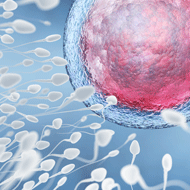
Scientists explore chemical causes for declining fertility
Chemicals found in the home and diet could explain declining male fertility in dogs and humans, new research shows.
Human male fertility has declined significantly in recent decades, with studies showing a 50 per cent global drop in sperm quality over the past 80 years.
Sharp declines have also been seen in dog fertility, suggesting that modern day chemicals in the home could be at least partly to blame.
Researchers from the University of Nottingham tested the effects of two man-made chemicals, the common plasticiser DEHP, which is widely abundant in the home, and the industrial chemical polychlorinated biphenyl 153, which remains widely detectable in the environment and food, despite being banned globally.
Identical experiments were carried out in both species, using sperm samples from donor men and stud dogs living in the same region of the UK. Results published in Scientific Reports show that the chemicals had the same detrimental effect on sperm from men and dogs.
Lead author Rebecca Sumner, who carried out the experimental work as part of her PhD, said: “In both cases and in both subjects, the effect was reduced sperm motility and increased fragmentation of DNA.
“We know that when human sperm motility is poor, DNA fragmentation is increased and that human male infertility is linked to increased levels of DNA damage in sperm. We now believe this is the same in pet dogs because they live in the same domestic environment and are exposed to the same household contaminants.”
Professor Gary England, dean of Nottingham vet school, said an important area for future research will be to look at regional impacts on sperm quality in men and dogs.



 RCVS Knowledge has called on vet practices to audit their post-operative neutering outcomes.
RCVS Knowledge has called on vet practices to audit their post-operative neutering outcomes.